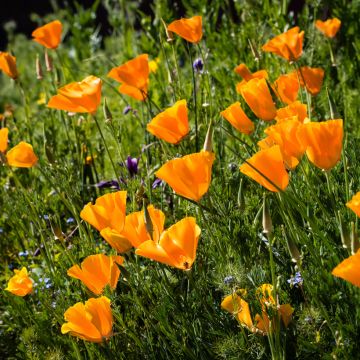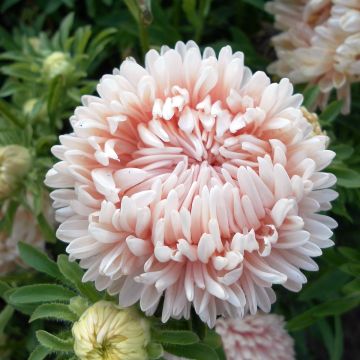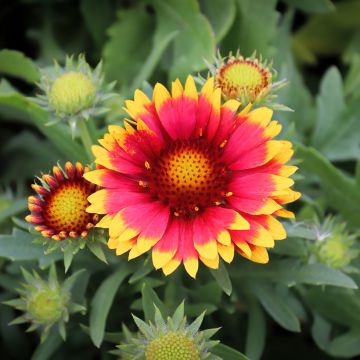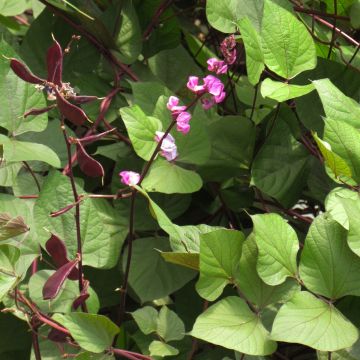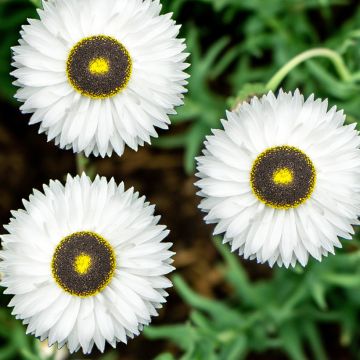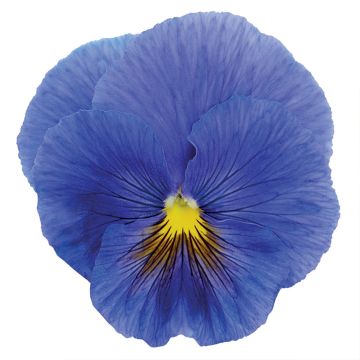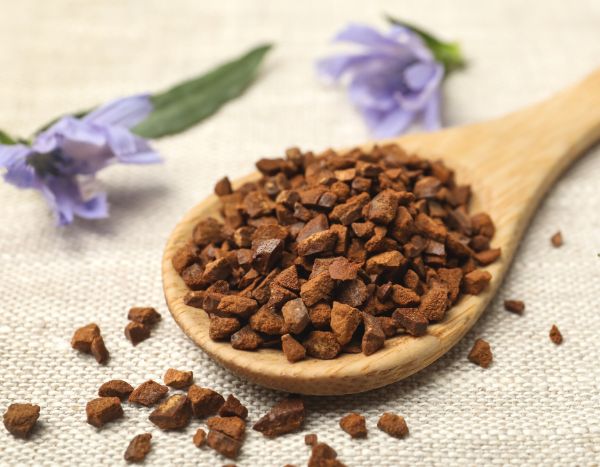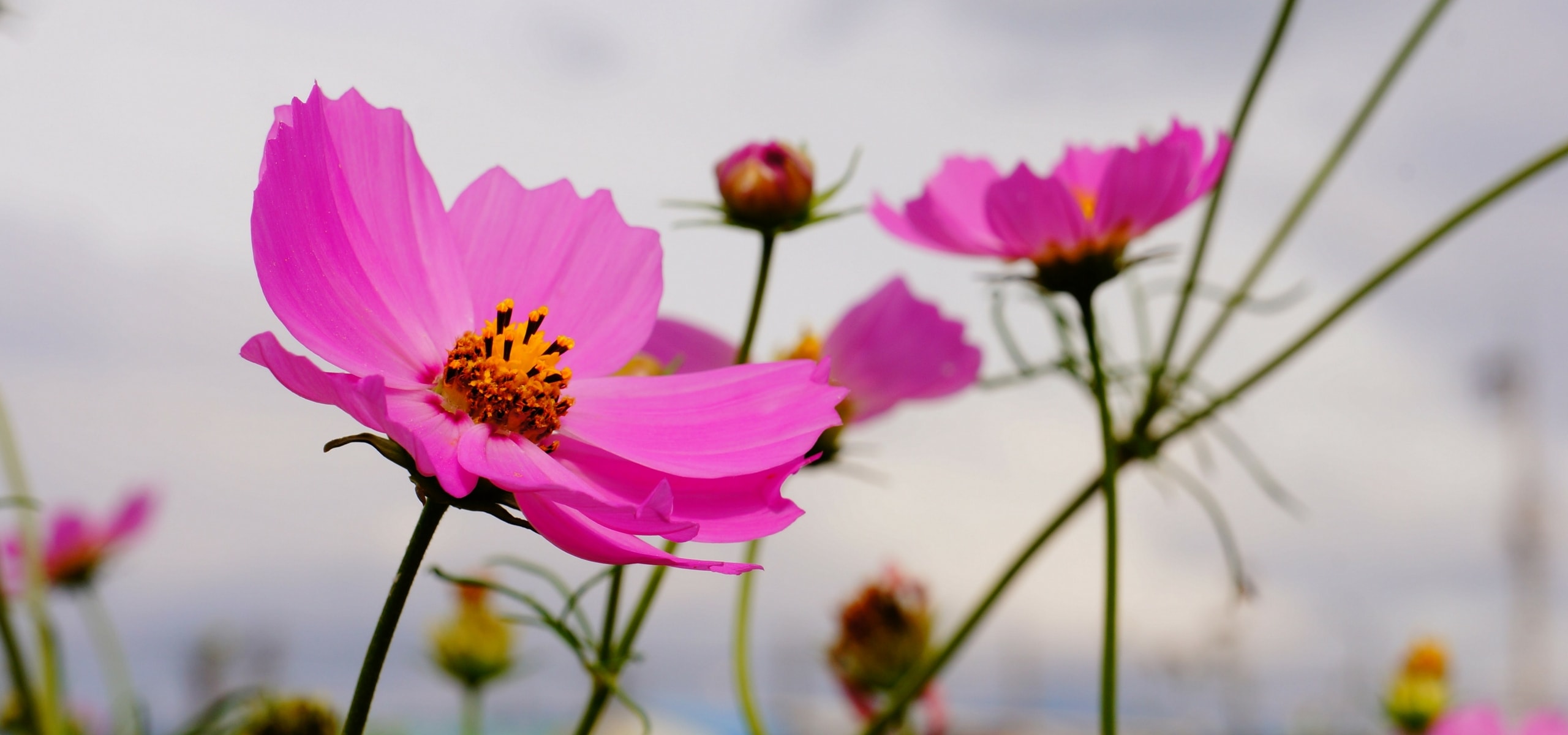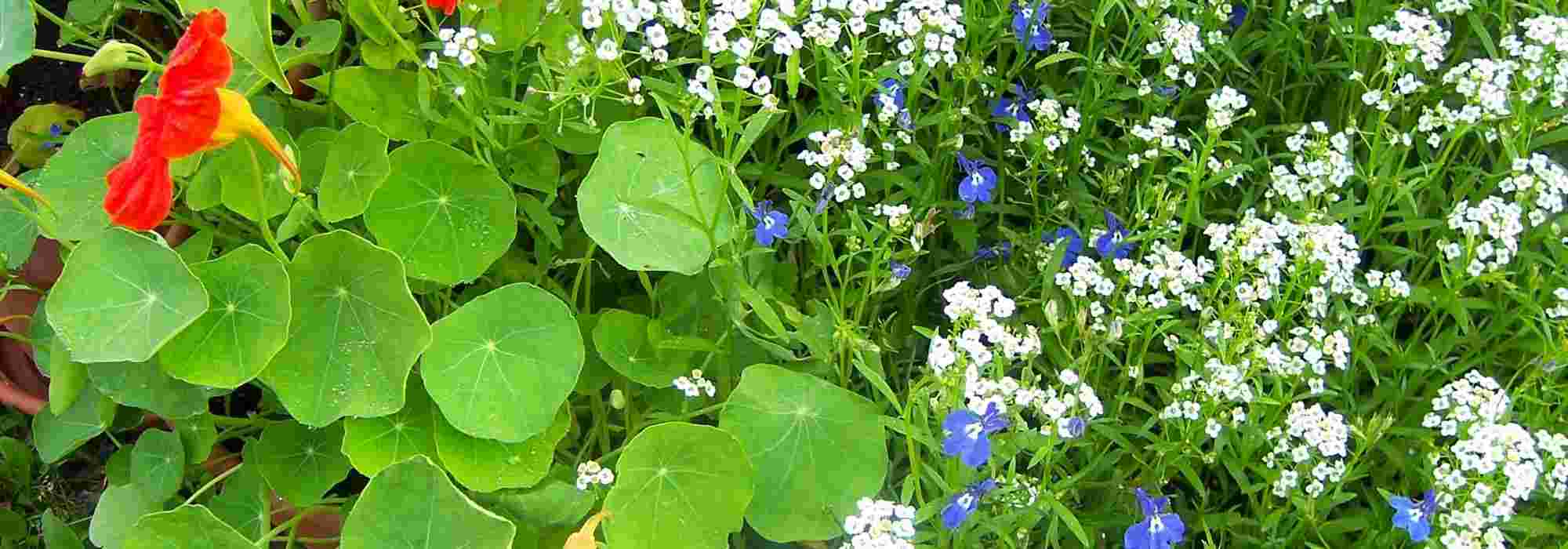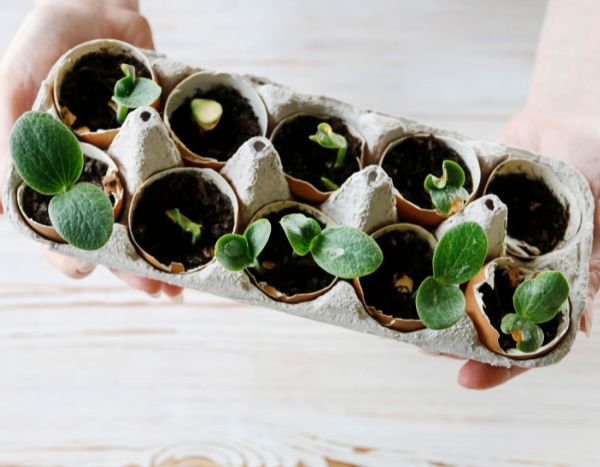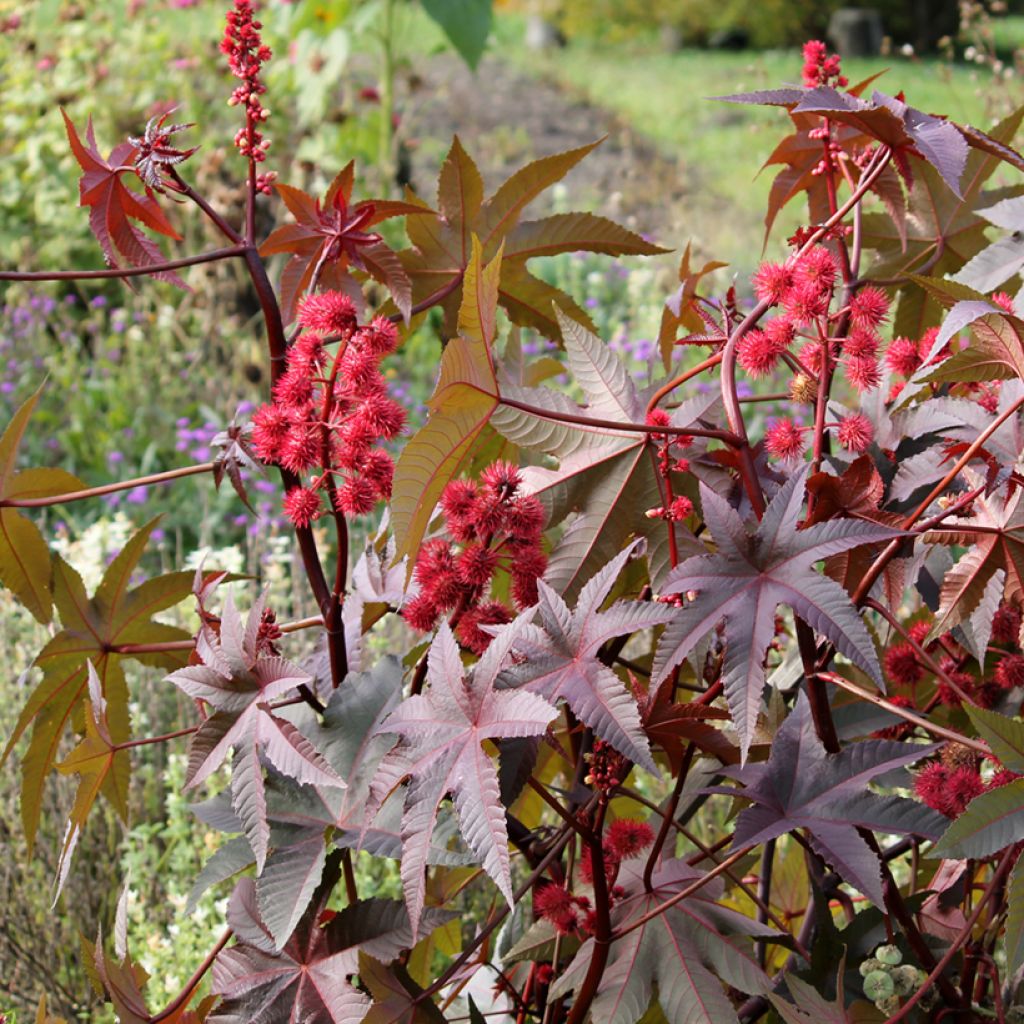

Ricinus communis Impala Seeds - Flowering Currant
Ricinus communis Impala Seeds - Flowering Currant
Ricinus communis Impala
Castor Oil Plant, Castor Bean
I have planted three seeds this year, which all germinated in a mini-greenhouse and then under a polytunnel. Today, in the fully prepared ground, near a drainage system, they seem to be flourishing and have nothing to envy their counterparts, planted by the local teams in various places, who are not more advanced in development than them. I love their exuberance in becoming...
Estelle, 13/07/2021
Special offer!
Receive a €20 voucher for any order over €90 (excluding delivery costs, credit notes, and plastic-free options)!
1- Add your favorite plants to your cart.
2- Once you have reached €90, confirm your order (you can even choose the delivery date!).
3- As soon as your order is shipped, you will receive an email containing your voucher code, valid for 3 months (90 days).
Your voucher is unique and can only be used once, for any order with a minimum value of €20, excluding delivery costs.
Can be combined with other current offers, non-divisible and non-refundable.
Home or relay delivery (depending on size and destination)
Schedule delivery date,
and select date in basket
This plant carries a 6 months recovery warranty
More information
We guarantee the quality of our plants for a full growing cycle, and will replace at our expense any plant that fails to recover under normal climatic and planting conditions.

Does this plant fit my garden?
Set up your Plantfit profile →
Description
Ricinus communis Impala, or Castor Oil Plant, is a tall, shrubby herbaceous annual with large, very shiny, palmate leaves of a very dark, burgundy green colour that change throughout its development. The fruits it produces are red and covered with thorns, making them very decorative.
The imposing size of the Ricin Impala (up to 1,2 metres high) allows it to be placed at the back of beds. In fact, it has such a well-branched habit that it can almost be considered a small shrub. Its red stems are smooth and strong and bear large palmate leaves divided into pointy, toothed lobes. The colours of the leaves often change, making it a particular astonishing addition to the garden. They are of a very dark burgundy hue, veined with red and display hints of green, sometimes purple, brown or even black, depending on its exposure to the light and its maturity. This flamboyant range of colours forms a dark, but warm and lively backdrop. Flowering starts in August in the form of yellow clusters which then turn into capsule-shaped fruit of a brilliant red colour. They are round and completely covered with small thorns. They last until October and bring warm colours to the garden in the autumn. It is a perennial that is grown as an annual in our climates. It will therefore prefer sunny positions, sheltered from the wind, with rich, moist, well-drained soil. Don't hesitate to water it in case of drought and to amend the soil that will host the ricin plants. Planted in tubs, it will also require some fertilizer to ensure an exuberant growth.
Castor Oil Plant is cultivated for its very rich oil, extracted from its big seeds. It has medicinal uses and is used in homeopathy and cosmetology. In the past it was even used as fuel for oil lamps in ancient times. However, these same benefits make all parts of the plant toxic, especially the seeds, and can even cause irritations. So be sure to warn children to stay away from its tempting beautiful fruits and keep pets away.
Ricinus communis Impala can be used as a specimen plant thanks to its well-branched habit, its large, glossy, colourful leaves and its clusters of scarlet fruit. However, when planted in small groups, it also forms a great backdrop for summer beds with yellow-orange coloured perennials and ornamental grasses.
Flowering
Foliage
Plant habit
Safety measures
Botanical data
Ricinus
communis
Impala
Euphorbiaceae
Castor Oil Plant, Castor Bean
Cultivar or hybrid
ingestion
Cette plante est toxique si elle est ingérée volontairement ou involontairement.
Ne la plantez pas là où de jeunes enfants peuvent évoluer, et lavez-vous les mains après l'avoir manipulée.
Pensez à conserver l'étiquette de la plante, à la photographier ou à noter son nom, afin de faciliter le travail des professionnels de santé.
Davantage d'informations sur https://plantes-risque.info
Other Thompson and Morgan seeds
View all →Planting and care
Ricin Impala is best sown under cover in a seed tray or in little pots from the month of March, since the seeds prefer temperatures between 20 and 25 °C. If the climate in your region is mild, you can start sowing in a greenhouse as early as February.
Soak the seeds for 24 to 48 hours in water beforehand. You will then place them at a depth of 1 cm in a rather well-drained growing medium (containing vermiculite) which you will keep slightly wet. They will germinate between 14 and 21 days. When the seedlings are large enough to be moved, you can separate them and prick them out in little pots, allowing you to keep them in warmer conditions until the frost period has passed. Afterwards, you can plant them in their final positions as soon as they reach 20/30 cm, which often happens during May. Or else, you can place them in planters or pots. If nights are still too cool, you can acclimatize them gradually by putting them outside during the day.
Sowing period
Intended location
Planting & care advice
-
, onOrder confirmed
Reply from on Promesse de fleurs
Haven't found what you were looking for?
Hardiness is the lowest winter temperature a plant can endure without suffering serious damage or even dying. However, hardiness is affected by location (a sheltered area, such as a patio), protection (winter cover) and soil type (hardiness is improved by well-drained soil).

Photo Sharing Terms & Conditions
In order to encourage gardeners to interact and share their experiences, Promesse de fleurs offers various media enabling content to be uploaded onto its Site - in particular via the ‘Photo sharing’ module.
The User agrees to refrain from:
- Posting any content that is illegal, prejudicial, insulting, racist, inciteful to hatred, revisionist, contrary to public decency, that infringes on privacy or on the privacy rights of third parties, in particular the publicity rights of persons and goods, intellectual property rights, or the right to privacy.
- Submitting content on behalf of a third party;
- Impersonate the identity of a third party and/or publish any personal information about a third party;
In general, the User undertakes to refrain from any unethical behaviour.
All Content (in particular text, comments, files, images, photos, videos, creative works, etc.), which may be subject to property or intellectual property rights, image or other private rights, shall remain the property of the User, subject to the limited rights granted by the terms of the licence granted by Promesse de fleurs as stated below. Users are at liberty to publish or not to publish such Content on the Site, notably via the ‘Photo Sharing’ facility, and accept that this Content shall be made public and freely accessible, notably on the Internet.
Users further acknowledge, undertake to have ,and guarantee that they hold all necessary rights and permissions to publish such material on the Site, in particular with regard to the legislation in force pertaining to any privacy, property, intellectual property, image, or contractual rights, or rights of any other nature. By publishing such Content on the Site, Users acknowledge accepting full liability as publishers of the Content within the meaning of the law, and grant Promesse de fleurs, free of charge, an inclusive, worldwide licence for the said Content for the entire duration of its publication, including all reproduction, representation, up/downloading, displaying, performing, transmission, and storage rights.
Users also grant permission for their name to be linked to the Content and accept that this link may not always be made available.
By engaging in posting material, Users consent to their Content becoming automatically accessible on the Internet, in particular on other sites and/or blogs and/or web pages of the Promesse de fleurs site, including in particular social pages and the Promesse de fleurs catalogue.
Users may secure the removal of entrusted content free of charge by issuing a simple request via our contact form.
The flowering period indicated on our website applies to countries and regions located in USDA zone 8 (France, the United Kingdom, Ireland, the Netherlands, etc.)
It will vary according to where you live:
- In zones 9 to 10 (Italy, Spain, Greece, etc.), flowering will occur about 2 to 4 weeks earlier.
- In zones 6 to 7 (Germany, Poland, Slovenia, and lower mountainous regions), flowering will be delayed by 2 to 3 weeks.
- In zone 5 (Central Europe, Scandinavia), blooming will be delayed by 3 to 5 weeks.
In temperate climates, pruning of spring-flowering shrubs (forsythia, spireas, etc.) should be done just after flowering.
Pruning of summer-flowering shrubs (Indian Lilac, Perovskia, etc.) can be done in winter or spring.
In cold regions as well as with frost-sensitive plants, avoid pruning too early when severe frosts may still occur.
The planting period indicated on our website applies to countries and regions located in USDA zone 8 (France, United Kingdom, Ireland, Netherlands).
It will vary according to where you live:
- In Mediterranean zones (Marseille, Madrid, Milan, etc.), autumn and winter are the best planting periods.
- In continental zones (Strasbourg, Munich, Vienna, etc.), delay planting by 2 to 3 weeks in spring and bring it forward by 2 to 4 weeks in autumn.
- In mountainous regions (the Alps, Pyrenees, Carpathians, etc.), it is best to plant in late spring (May-June) or late summer (August-September).
The harvesting period indicated on our website applies to countries and regions in USDA zone 8 (France, England, Ireland, the Netherlands).
In colder areas (Scandinavia, Poland, Austria...) fruit and vegetable harvests are likely to be delayed by 3-4 weeks.
In warmer areas (Italy, Spain, Greece, etc.), harvesting will probably take place earlier, depending on weather conditions.
The sowing periods indicated on our website apply to countries and regions within USDA Zone 8 (France, UK, Ireland, Netherlands).
In colder areas (Scandinavia, Poland, Austria...), delay any outdoor sowing by 3-4 weeks, or sow under glass.
In warmer climes (Italy, Spain, Greece, etc.), bring outdoor sowing forward by a few weeks.































